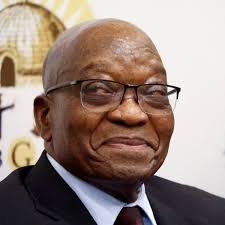Zuma Suspended from the ANC

Jacob Zuma
The recent suspension of former South African President Jacob Zuma from the African National Congress (ANC) has sent shockwaves through the country’s political landscape. This move has significant implications for both Zuma and the ANC, as well as for the future of South African politics.
Zuma’s suspension comes after years of controversy and allegations of corruption during his presidency. The ANC’s decision to suspend him is a clear indication that the party is taking a stand against corruption and is committed to restoring its reputation. This move is seen as a necessary step towards rebuilding public trust in the ANC and the government as a whole.
One of the immediate implications of Zuma’s suspension is the potential for a further divide within the ANC. Zuma still has a significant following within the party, and his suspension could lead to a split or factionalism within its ranks. This could weaken the ANC’s position and make it more difficult for the party to govern effectively.
The ANC has been facing declining support in recent years, and Zuma’s suspension could further erode the party’s popularity. This could open the door for other political parties to gain ground and potentially challenge the ANC’s dominance.
Another implication of Zuma’s suspension is the impact it could have on the ongoing investigations into corruption and state capture. Zuma has been implicated in numerous corruption scandals, and his suspension could provide an opportunity for these investigations to proceed without interference. This could be a significant step towards holding those responsible for corruption accountable and restoring faith in the rule of law.
However, it is important to note that Zuma’s suspension does not automatically mean that justice will be served. The ANC has been criticized in the past for its slow response to corruption allegations, and there are concerns that Zuma’s suspension could be a mere symbolic gesture. It will be crucial for the ANC to follow through with a thorough and transparent investigation into the allegations against Zuma to ensure that justice is served.
Furthermore, Zuma’s suspension raises questions about the future of the ANC and its leadership. This will be no easy task, as the ANC is a broad and diverse party with competing factions and interests. The party will need to carefully navigate this process to ensure that it selects a leader who can effectively lead and rebuild the party.
Zuma’s suspension from the ANC has significant implications for both him and the party. It is a clear indication that the ANC is taking a stand against corruption and is committed to restoring its reputation. However, the suspension also raises questions about the future of the ANC and its leadership. It will be crucial for the party to navigate this process carefully and ensure that justice is served. Only then can the ANC begin to rebuild public trust and move forward towards a more transparent and accountable government.
Zuma’s Legacy and the Future of South African Politics
Jacob Zuma, the former president of South Africa, has been suspended from the African National Congress (ANC), marking a significant turning point in the country’s political landscape. This decision comes after years of controversy and allegations of corruption that have plagued Zuma’s presidency. As South Africa looks to the future, it is crucial to examine Zuma’s legacy and the potential impact his suspension will have on the country’s political future.
Zuma’s presidency was marred by numerous scandals and allegations of corruption. From the controversial arms deal in the late 1990s to the infamous Nkandla scandal, where millions of taxpayer funds were used to upgrade Zuma’s private residence, his tenure was characterized by a lack of transparency and accountability. These scandals not only eroded public trust in the ANC but also damaged South Africa’s international reputation.
Furthermore, Zuma’s economic policies were widely criticized for their failure to address the country’s high unemployment rate and stagnant economic growth. Despite promises to prioritize job creation and economic development, Zuma’s administration struggled to implement effective policies. As a result, South Africa’s economy remained sluggish, and inequality continued to widen under his leadership.
Zuma’s suspension from the ANC is a significant step towards holding him accountable for his actions. It sends a clear message that no one, regardless of their position, is above the law. However, it is important to note that this suspension alone is not enough to address the deep-rooted issues that have plagued South Africa’s political system for years.
The ANC, as the ruling party, must now focus on rebuilding its reputation and regaining the trust of the South African people. This will require a commitment to transparency, accountability, and good governance. The party must also prioritize the needs of the country over the interests of a few individuals. Only by doing so can the ANC hope to restore faith in its ability to lead and govern effectively.
Zuma’s suspension also raises questions about the future of the ANC and South African politics as a whole. With Zuma out of the picture, there is an opportunity for new leadership to emerge and steer the country in a different direction. However, it remains to be seen whether the ANC will seize this opportunity or continue to be plagued by internal divisions and power struggles.
Moreover, Zuma’s suspension may have broader implications for the political landscape in South Africa. It could potentially pave the way for the rise of new political parties or the strengthening of existing ones. The country’s citizens, disillusioned by years of corruption and mismanagement, may be more inclined to support alternative political movements that promise change and accountability.
Jacob Zuma’s suspension from the ANC marks a significant moment in South African politics. It is a step towards holding him accountable for his actions and a chance for the ANC to rebuild its reputation. However, it is crucial to recognize that this suspension alone is not enough to address the deep-rooted issues that have plagued the country’s political system. The ANC must commit to transparency, accountability, and good governance to regain the trust of the South African people. Furthermore, Zuma’s suspension raises questions about the future of the ANC and South African politics as a whole. It is an opportunity for new leadership to emerge and for the country to chart a different course. Only time will tell whether South Africa can overcome its challenges and move towards a brighter future.


